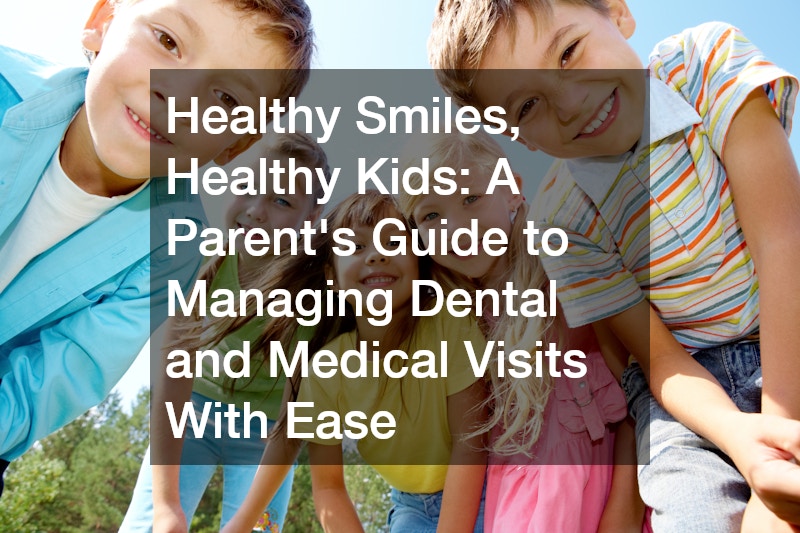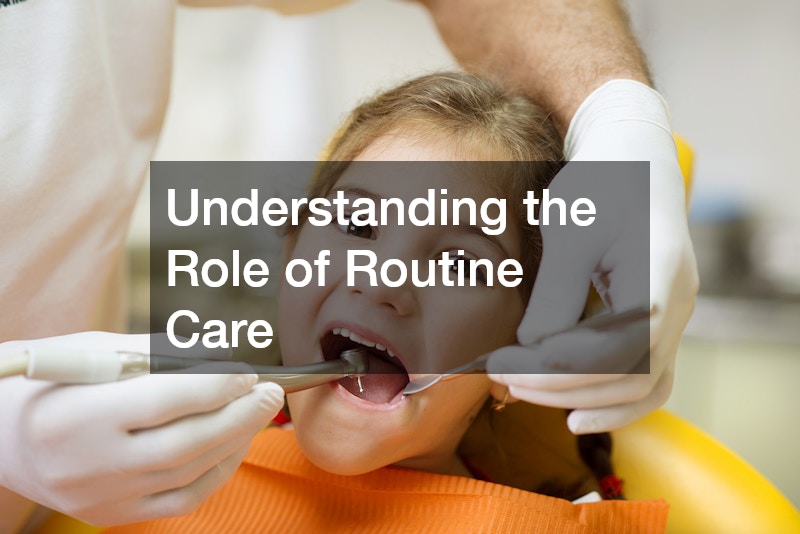Healthy Smiles, Healthy Kids: A Parents Guide to Managing Dental and Medical Visits With Ease


Every parent dreams of seeing their children smile confidently while staying strong and healthy. But coordinating both dental and medical visits can feel like a constant juggling act. Between sports practices, school activities, and family time, fitting in appointments for cleanings, checkups, or sudden illnesses can quickly become overwhelming. Learning how to manage these visits efficiently ensures that children’s health never falls through the cracks. It also teaches children that caring for themselves is a regular part of life, not a stressful event. This guide explores how parents can streamline both dental and medical care while encouraging positive attitudes toward health. From choosing the right providers to handling emergencies with confidence, families can build lasting systems that make care simple and effective. When routines are organized, children experience less anxiety and more comfort during visits. With the right approach, parents can focus less on scheduling and more on raising healthy kids who grow up valuing strong oral and physical well-being in every stage of life. Families who plan proactively are more likely to see their children develop confidence, patience, and independence when visiting health professionals.
Building Trust With Your Dental Team
Finding a dependable family dentist is one of the best investments a parent can make in their child’s long-term health. These professionals specialize in caring for patients of all ages and provide consistent, compassionate attention that helps children feel secure. Early experiences at the dental office play a big role in shaping how kids perceive oral care as they grow. When the same provider serves the entire family, children become more comfortable and familiar with the process. Many offices create inviting environments with colorful décor, gentle communication, and clear explanations designed for young patients. Parents can also learn about cavity prevention, nutritional advice, and brushing techniques suited for different developmental stages. Regular visits every six months allow early detection of dental concerns before they become painful or costly. Families who establish this trust early often find that dental care becomes an easy, routine part of family life. That comfort helps nurture healthy kids who feel proud of their smiles and motivated to maintain them. Furthermore, the consistency of having one provider builds a relationship based on familiarity and security, which can make a lifelong difference in a child’s willingness to seek care as an adult.
Exploring a Holistic Approach to Oral Wellness

For parents seeking a more natural approach, choosing a holistic dentistry office can align oral care with overall well-being. This type of dental practice focuses on the connection between oral health and the body’s broader systems, emphasizing prevention and balance. Treatments often incorporate biocompatible materials and gentle techniques that minimize exposure to harsh substances. Holistic providers may also discuss nutrition, breathing habits, and lifestyle factors that influence oral and systemic health. For example, they might explore how inflammation in the mouth relates to digestion or how certain foods affect gum strength. This perspective helps parents view dental visits as opportunities to enhance total wellness rather than just fix problems. Children benefit from learning that their bodies work as an interconnected system, where good habits in one area support another. Families who take this route often enjoy a more personalized, educational experience. By encouraging mindfulness and understanding, parents build the foundation for healthy kids who appreciate both natural living and preventive care. This approach also empowers children to see health as a daily choice—one built on nutrition, hydration, and awareness rather than fear or obligation.
Handling Unexpected Dental Problems Confidently
Even with regular care, dental emergencies happen. Knowing where to find trusted emergency dentists can make all the difference when time matters most. A sudden toothache, chipped tooth, or injury during sports can be alarming, especially for children. Having a reliable plan ensures that parents can act quickly and calmly. Emergency dental clinics often provide same-day service, extended hours, and flexible scheduling to accommodate urgent cases. These professionals are trained to relieve pain, prevent infection, and restore comfort swiftly. Parents should keep their preferred emergency contact saved on their phone and share it with babysitters or family members. In addition, teaching kids basic safety—like wearing mouthguards and avoiding chewing hard objects—can help prevent accidents altogether. Quick, confident action during emergencies shows children that problems can be handled efficiently, reducing their fear of future dental visits. This reassurance plays an essential role in raising healthy kids who trust that care providers will always be there to help them heal and smile again. Parents who practice preparedness also teach their children calmness under pressure—a valuable life skill that reaches far beyond the dentist’s chair.
Understanding the Role of Routine Care

Routine care from a general dentist is the backbone of lifelong oral health. These professionals provide preventive services that catch problems before they develop into larger issues. Regular checkups typically include cleanings, X-rays, fluoride treatments, and education on brushing techniques tailored to children’s needs. Building a consistent routine encourages responsibility and reduces anxiety. When dental visits are seen as normal rather than exceptional, kids become more cooperative and confident. Parents should aim to schedule checkups every six months and make them part of family calendars, just like school or extracurricular commitments. Many general dental offices also offer gentle orthodontic screenings to monitor jaw growth and tooth alignment. Discussing small concerns early—such as teeth grinding or thumb-sucking—can prevent bigger issues later. Consistency ensures stability, which helps parents and children alike. Through preventive appointments and good communication, families strengthen habits that last for life. These simple steps create the structure needed to raise healthy kids who value care, comfort, and commitment to their smiles. Over time, these visits also become education opportunities, empowering kids to ask questions and understand their own dental progress.
Considering Options for Restorative Care
Sometimes, despite best efforts, teeth can become damaged or lost. In such cases, understanding solutions like a dental implant can prepare families for potential future needs. Dental implants act as long-lasting replacements for missing teeth, restoring function, balance, and confidence. Although they are typically used in adult dentistry, learning about restorative procedures helps parents plan ahead. Early conversations about long-term oral health encourage kids to see dentistry as something proactive rather than reactive. Parents can also discuss how habits such as proper brushing, flossing, and balanced nutrition prevent tooth loss in the first place. Restorative treatments represent modern innovation and reassurance that solutions exist when problems arise. By modeling calm, informed decision-making, parents teach children that health challenges are manageable. Discussing these topics helps build knowledge and confidence in both parents and children. These lessons ultimately promote healthy kids who understand that oral health contributes to comfort, self-esteem, and overall physical well-being throughout their lives. Parents who discuss these possibilities early foster resilience and maturity, turning potential fear into curiosity about how science helps maintain lifelong smiles.
Knowing Where to Turn for Urgent Medical Needs

While dental visits are important, every parent also faces moments when children require immediate medical attention. Pediatric urgent care centers provide specialized services tailored to the needs of young patients who need quick attention but do not require emergency room visits. These clinics offer fast access to healthcare for common issues such as fevers, minor injuries, allergic reactions, or infections. The staff is trained to work with children, using child-friendly communication and gentle techniques. Parents can often schedule visits online, reducing wait times and stress. Many facilities also offer weekend or evening hours, making them a convenient option for busy families. By establishing a relationship with a trusted urgent care provider, parents can feel confident that help is always within reach. Understanding when to choose urgent care over the emergency room can save time and expense. These dependable resources help parents manage unexpected challenges while ensuring that healthy kids recover quickly, safely, and with compassionate support. This preparedness builds emotional confidence in both children and parents, turning stressful health moments into learning opportunities about self-care and patience.
Working With Specialized Providers
For broader family wellness, dentists often collaborate with other professionals such as sleep doctors. Sleep quality affects many aspects of a child’s development, including concentration, growth, and mood. Sleep issues can also influence oral health, as children who experience breathing difficulties or snoring may develop misaligned teeth or jaw tension. Working with a sleep specialist helps identify underlying causes and coordinate care between dental and medical professionals. Sometimes, dental devices or orthodontic treatments play a role in improving nighttime breathing. Open communication among providers creates a complete picture of a child’s health and supports more effective solutions. Parents should track symptoms like fatigue, mouth breathing, or restless sleep and share these details during appointments. By addressing both sleep and oral health, families can prevent long-term complications and promote overall wellness. This integrated approach ensures that healthy kids receive holistic care that supports their growing bodies, bright minds, and strong smiles all at once. In addition, collaboration among experts gives parents peace of mind, knowing every aspect of their child’s development is being carefully supported.
Taking Advantage of Technology for Convenience

Modern parents have more tools than ever to simplify healthcare management. Through virtual care, families can schedule consultations, follow-ups, and even certain types of therapy sessions without leaving home. This technology offers incredible convenience for busy households juggling multiple commitments. Virtual appointments are especially helpful for checking in on minor issues, getting medical advice, or reviewing test results. Many dental and medical offices now integrate secure online platforms that allow parents to communicate with providers, upload photos, and access records. This reduces travel time, minimizes disruptions, and supports ongoing communication between parents and healthcare teams. Virtual options are also beneficial for families living in rural areas or those with limited transportation. As telemedicine continues to evolve, it bridges gaps between parents and professionals, improving consistency in care. By embracing these innovations, parents can focus on building flexible routines that ensure consistent attention to wellness. Such adaptability helps families raise healthy kids who experience care as accessible, supportive, and stress-free. It also teaches digital responsibility, showing children how technology can be used thoughtfully to improve their quality of life.
Supporting Orthodontic Development
As children grow, they often need guidance to ensure their teeth and jaws develop properly. This is where pediatric orthodontists come in. These specialists focus on diagnosing, preventing, and correcting alignment issues in young patients. Early orthodontic evaluations can identify potential problems long before they become serious, allowing for simpler and shorter treatments. Pediatric orthodontic care is about more than aesthetics—it also supports healthy speech, chewing, and breathing. Parents can ask for assessments around age seven, when permanent teeth start to appear. Many orthodontic offices offer gentle approaches that make kids feel comfortable and involved in their treatment plans. Educating children about why braces or aligners are necessary helps them take ownership of their care. Regular follow-ups with orthodontists reinforce progress and encourage compliance. By addressing these issues early, families prevent complications later in life and promote stronger oral health outcomes. These proactive measures play a major role in raising healthy kids with confident smiles and balanced development. When parents celebrate progress, it reinforces self-esteem, patience, and the value of perseverance.
Balancing medical and dental care doesn’t have to be stressful when families take a proactive, organized approach. By working closely with trusted providers, communicating openly, and scheduling visits consistently, parents can streamline their children’s care routines. Establishing trusted partnerships with professionals—whether it’s a dentist, doctor, or specialist—ensures that every aspect of a child’s health receives attention. Technology, preparation, and education all help create smoother experiences and fewer surprises. When children grow up feeling supported and confident during their appointments, they carry those positive habits into adulthood. The goal is simple yet powerful: to raise healthy kids who view wellness as a lifelong priority, not a temporary task. From the first cleaning to adolescent checkups, every step reinforces independence and understanding. Managing dental and medical visits with ease helps parents focus on what truly matters—building happy, resilient, and thriving families where every smile reflects both care and love. When families stay consistent and compassionate, they create a legacy of wellness that will shine for generations to come.